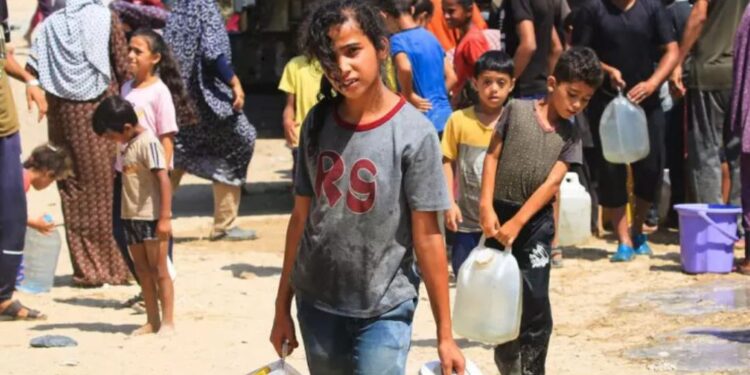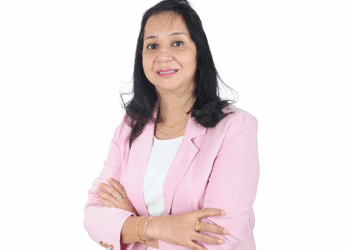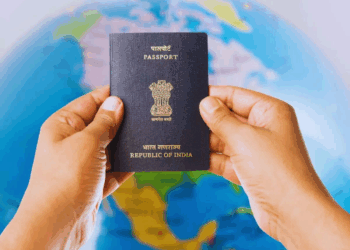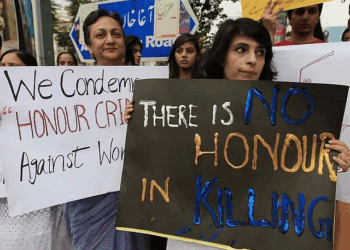As temperatures soar across the Gaza Strip this summer, families like the al-Manasras are facing a growing crisis: the simple act of collecting clean water has become a dangerous, exhausting, and often deadly task.
After a missile strike on Sunday killed eight people at a water distribution point in the Nuseirat refugee camp, the risks of securing clean water are more apparent than ever. The Israeli military claimed the missile, intended for militants, malfunctioned and missed its target. However, for many Palestinian families already enduring severe shortages, this tragedy is one more layer in a deepening humanitarian catastrophe.
Living in a tent near the shattered remains of their home in Gaza City, 51-year-old Akram Manasra and his family of 10 rely on limited public water sources to survive. On Monday, Manasra and three of his daughters carried plastic containers to a nearby tap in the sweltering heat. But despite the effort, they could only fill two containers—barely enough for drinking, let alone bathing or washing.
“There’s no water,” said Manasra. “Our children have been infected with scabies. There are no hospitals to go to and no medications.”
Water Crisis Reaches Breaking Point
According to a July report from the United Nations Office for the Coordination of Humanitarian Affairs (OCHA), Gaza’s water crisis—caused by 21 months of ongoing conflict and four months of near-total Israeli blockade—is having “devastating impacts on public health.”
Fuel shortages and restricted access to desalination plants have severely disrupted water sanitation services. Many wells remain inaccessible due to Israeli military control, and fuel blockades have halted essential waste management systems. As a result, the contamination of limited water sources is accelerating, spreading diseases like diarrhoea, jaundice, and skin infections—especially among children.
“If electricity was allowed to reach desalination plants, this lethal lack of water could be resolved within 24 hours,” said James Elder, spokesperson for UNICEF. “What possible reason can there be for denying families their basic water needs?”
Daily Routine Built Around Water Survival
Inside their tent, the Manasra family has developed a survival routine around their water supply. Every drop is used, reused, and rationed.
The cleanest water is set aside for drinking and minimal personal hygiene. Water that runs off during washing is collected in a basin and reused for dishes. That same water—now grey and soiled—is finally used for laundry.
“It’s been three months since we washed the bed covers. How is this water enough for 10 people—for showering, cleaning, and cooking?” Manasra asked.
With no running water and only two filled containers, even basic cleaning is a challenge. The family sweeps the ground inside their tent to try and maintain some level of cleanliness. Meanwhile, skin conditions worsen among the children, with one of Manasra’s daughters showing painful rashes across her back from untreated infections.
His wife, Umm Khaled, described how she washed clothes in the shallow remains of a puddle left at the bottom of a bucket, after using the cleaner water for drinking and cooking.
“My daughter has severe heat rash and scabies,” she said. “Two of my children were vomiting and had fever yesterday because of the dirty water. I’ve gone to several doctors and they prescribed medications, but we can’t always get them.”
The Hidden Cost of Survival
Water scarcity in Gaza is not a new issue, but the blockade and prolonged conflict have turned it into a deadly crisis. According to humanitarian agencies, more than 95% of Gaza’s water is undrinkable. Fuel shortages mean sewage is no longer being processed correctly, polluting the groundwater and increasing the risk of disease.
The situation is especially dire in crowded tent camps, where displaced families live in unsanitary conditions without access to reliable medical care or basic hygiene facilities. The impact is visible—children with sunburn, scabies, diarrhoea, and infections are now a common sight in these communities.
And with summer heat rising and no clear end to the blockade or hostilities, many Gazans fear the worst is yet to come.
“We are not asking for luxury,” said Akram Manasra. “Just water—clean, safe water—for our children to live.”
For more updates on the humanitarian crisis in Gaza and the Middle East, follow Desert






